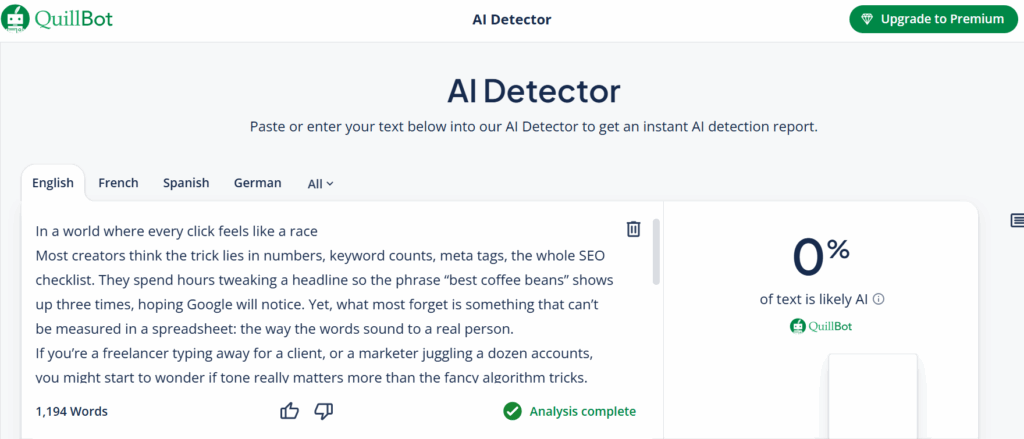In a world where every click feels like a race
Most creators think the trick lies in numbers, keyword counts, meta tags, the whole SEO checklist. They spend hours tweaking a headline so the phrase “best coffee beans” shows up three times, hoping Google will notice. Yet, what most forget is something that can’t be measured in a spreadsheet: the way the words sound to a real person.
If you’re a freelancer typing away for a client, or a marketer juggling a dozen accounts, you might start to wonder if tone really matters more than the fancy algorithm tricks. The answer could be yes, but it’s not that simple. Tone is the voice that makes a brand feel human. It can turn a bland article into a conversation you want to keep having. On the flip side, ignoring SEO completely could leave your brilliant story hidden in the depths of the internet.
Take the local bakery down the street. Their Instagram posts are full of warm, buttery language, “fresh out of the oven, just for you”. People comment, share, and actually walk in. Their competitor, who uses perfect keyword placement about “artisan sourdough”, gets a few clicks but no foot traffic. The difference? The tone invited people in, the keywords only brought strangers to a page no one cared about.
But don’t think tone can replace all the technical stuff. A blog about a new laptop that sounds friendly but never appears in search results won’t help anyone find it. You still need the basics, good titles, proper tags, otherwise the voice has nowhere to go.
So, maybe the best approach is a blend. Use enough SEO to get noticed, then let the tone do the heavy lifting of keeping readers. It’s like planting a seed (the keywords) and watering it with personality. If you get both right, the plant might actually grow. Otherwise, you’re just shouting into an empty room.
For anyone making stuff online, getting why tone of voice matters is kinda a big deal. It ain’t just a cute style choice – it’s a tool you can lean on. When you keep the same vibe on your blog, your newsletter, and even that quick tweet, people start to know you right away.
Think about it: metrics like how long folks stick around on a page, whether they bounce fast, or how many times they hit share. Those numbers don’t care about keywords. They care about whether the words feel right. If your tone lines up with what your crowd likes, they’ll probably linger, read a bit more, maybe even comment. A B2B software firm that sells to big companies? They’d probably go for a tone that sounds solid and data‑driven. On the flip side, a sneaker‑obsessed blog aimed at college kids could rock a laid‑back, chatty vibe.
Why does this matter so much?
It builds trust – when the voice stays the same, readers feel safe, like they’re in the right spot.
It sets expectations – folks know what kind of talk they’ll get and don’t get surprised.
It creates a memorable experience – a quirky voice can stick in heads better than a bland one.
Some freelancers even say they can ask for higher pay once they nail tone. Agencies claim happy clients stay longer because the content feels personal, not just generic copy. But there’s a catch: if you try too hard to sound “cool” or “expert” and it feels forced, the audience might sniff it out. Authenticity may win over perfect polish any day.
So, while tone can boost clicks, shares, and maybe even your paycheck, it also needs to feel real. Otherwise, all that consistency could end up feeling fake. Keep it simple, keep it you, and watch the numbers follow.
Why Tone of Voice Is the Key to Differentiation in a Crowded Market
The web is bursting with articles that tick every SEO box, yet most of them feel flat. Keywords alone don’t make you stand out, anyone can drop the same phrase. What does set you apart may be the way you actually sound online.
Think of a brand’s tone as its digital fingerprint. It shows personality, values and a point of view. For copywriters or agency crews in tight‑knit niches, that fingerprint can turn into a secret weapon.
Imagine two pieces ranking for “best coffee maker”. One reads like a boring manual, the other feels like a chat with a buddy who knows your taste. Which one would you click again, share, or link to? Probably the friendly one, that’s the power of tone.
Why Tone Can Grow Faster Than You Expect
Some folks claim SEO scales easier because it’s pure data. But tone isn’t immune to scaling either. With clear brand guidelines and a tone‑of‑voice cheat sheet, even large teams can keep the voice steady. Freelancers can follow the same sheet and still sound like the brand’s own voice.
A good tone guide usually lists:
Typical sentence patterns and word choices
The emotional vibe (optimistic, firm, caring, etc.)
“Do” and “don’t” examples for phrasing
Once that playbook is set, you can keep the same feel across blog posts, newsletters, Instagram stories and even those quick tweets.
Still, there’s a catch. Over‑systematizing might strip away the human touch. If every writer sticks too rigidly‑by‑the‑rules, the content could end up sounding robotic again. A little wiggle room could let personality shine through while staying on brand.
So, is tone just another checklist item? Probably not. It feels more like a living thing that needs both structure and breathing space. When brands get that balance right, they not only rank higher, they earn a spot in people’s minds.
In short, tone of voice isn’t just fluff; it’s the quiet engine that drives real connection in a sea of sameness.
Why Tone of Voice Might Be the Future of SEO
Search engines are changing. AI and plain‑language tools seem to get better at reading what we mean, not just the words we type. That could mean writing for people and for bots ain’t a two‑way street any more.
Google’s “Helpful Content” update, for example, seems to give a thumbs up to pages that talk to humans, not machines. So if you’re still stuffing weird keywords and ignoring how you sound, you’re probably left behind.
Here’s why a clear tone could keep your SEO safe:
It fits Google’s move toward “user‑first” stuff.
It lets you slip in semantic words without trying too hard.
It might boost the time folks stay on your site and cut the bounce.
When search engines care more about real help than keyword tricks, your tone turns from a style choice into a ranking trick.
Balancing Tone and SEO
Don’t think this means ditching keywords totally. SEO still matters – it should support the voice, not crush it. You can try this simple plan:
Know your readers – think about how they talk, what they value, what they expect.
Pick three words that sum up your brand’s voice – maybe “friendly”, “direct”, “fun” – and stick with ’em.
Drop keywords in naturally – let them sit inside sentences that already sound like you.
Keep it clear – don’t over‑complicate just to please a robot.
Some folks might argue that keywords are still king. That could be true for ultra‑niche sites, but for most brands the human feel seems to win in the long run. So maybe, just maybe, focusing on tone is the smarter play today.
Why Your Voice Beats the Latest SEO Trend
SEO tricks pop up, then fade. Google tweaks its rules, and you see new tools every month. But the way you sound? That feels more like forever. It gives a human touch that makes a post feel real, easy to recall, and quick to share. For a freelance writer or a small agency, putting energy into tone is really putting energy into the brand’s future.
Clients often hand over a list of keywords, saying “use these”. Yet, what they probably want is copy that actually sells. Sales don’t happen because a page is full of “best‑price” or “top‑rated”. They happen because a reader feels a tiny spark, a sense of trust. That spark? It starts with the voice you choose.
Next time you open a document, pause. Ask: “Am I writing just to climb the rankings, or am I trying to strike a chord?” The piece that ends up on the top of a search list might disappear fast. The piece that sticks in a reader’s mind? That one keeps bringing people back, even if it’s not number one.
If you’re serious about cutting through the noise, shift the lens a bit. Yes, know your keywords. Yes, sprinkle them where they fit. But the real power? Mastering the tone that matches the audience’s vibe. That’s where the magic lives.
Some might say tone is just fluff, that algorithms rule everything. Sure, the code matters, but without a voice that feels genuine, the algorithm can only take you so far. Tone isn’t just “more important than keywords”; it’s the base that lets everything else work. So, write with heart, not just with data.











